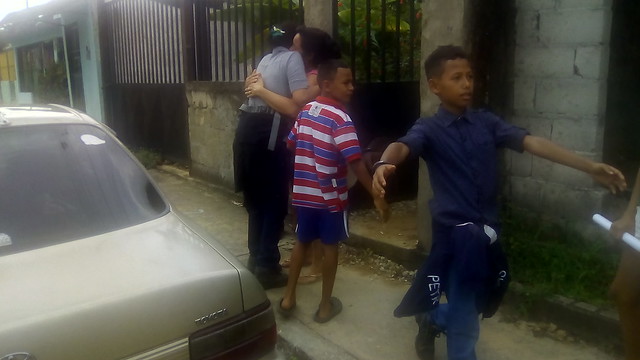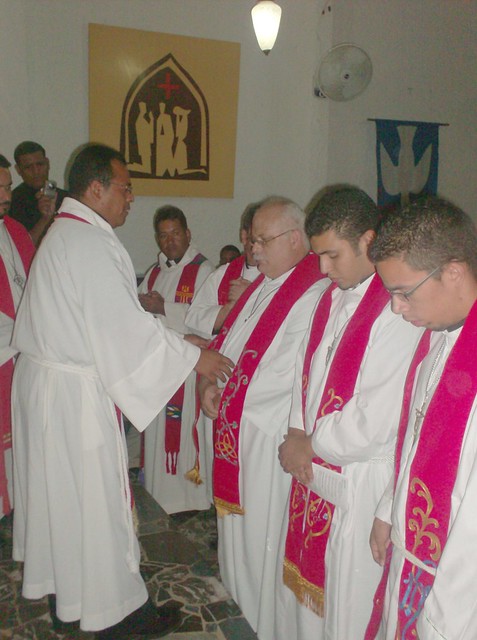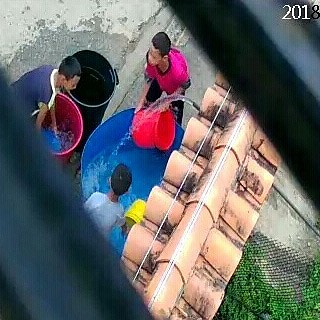 |
| Leavetaking is common in Venezuela. |
There have been many diasporas throughout human history. For instance, the mass emigration of the Irish during the great potato famine of 1845 to 1849. My own ancestors (those that spoke German) were among the “altluteraner”, the Old Lutherans, who fled religious persecution in the Kingdom of Prussia in the early 1800s. Some of them emigrated to the United States, others to Australia.
Many people today understand Diaspora with a capital “D” to mean the forced flight of the Jews from the Holy Land after the Romans destroyed Jerusalem and the Temple in 70 A.D. But that was not, in fact, the first Jewish diaspora. The Babylonians under King Nebuchadnezzar II also destroyed Jerusalem and the first Temple, built by Solomon, in 586 BC. Later the Persian Emperor Cyrus allowed the Jewish people to return to their homeland and rebuild the city and the temple. But many Jews did return, and, during the 300 to 400 years before Jesus was born, thriving Jewish communities grew in nearly every part of the ancient Mediterranean world. This also meant that many parts of the pagan world gained familiarity with the Jewish language, culture and religion.
By the early first century, “the diaspora” had come to mean the entire community of Jews living outside of the Holy Land. The word is used in this way in John 7:35. The dispersion of Jewish Christians from Jerusalem in the face of persecution (but before the destruction of the city) is described as “the diaspora” in James 1:1 and 1 Peter 1:1
It was the diaspora of both Jews and Jewish Christians that provided the seedbed in which the early church grew beyond the boundaries of Jerusalem and of Jewish culture. Paul, who was known as, and called himself, “the apostle to the Gentiles”, on his missionary journeys always first seek out a synagogue in the cities that he visited.
Likewise, in Venezuela, Lutheran Church – Missouri Synod work begin in the early 1950s primarily in response to a call from Germans who had migrated to Venezuela in the aftermath of World War II. This led in time to the development of a predominantly Spanish-speaking Lutheran Church of Venezuela.
Which brings me to the topic of the “Venezuelan diaspora”. While the flight of Syrians from their country’s civil war has been called the century’s first great refugee crisis, some analysts estimate the exodus of Venezuelans from Venezuela may surpass it.
"The next refugee crisis is not being driven by a violent war but by a socioeconomic disaster of magnitudes hardly seen before," says Dany Bahar, a Brookings Institution economist. While United Nations data indicates there are currently 5.5 million Syrian refugees, about 4 million Venezuelans (over 10 percent of the population) and the number of Venezuelan refugees could surpass that of Syria.
“This is a humanitarian crisis,” Willington Munoz Sierra, regional director of the Scalabrini International Migration Network, a Catholic charity running a shelter in Cucuta, Colombia, told the Washington Post. In Cucuta and other border towns, desperate Venezuelans are live in parks and cheap motels or sleep on sidewalks.
As sad as this situation is, it is encouraging to hear that the dispersion of Venezuelan Lutherans may open doors to mission and mercy work in surrounding countries. On May 6, we said farewell to Luz Maria’s daughter, Yepci, and her three children, Aaron, Oriana and Elias, as they left for Peru. Our prayers were answered as they arrived safely in Lima. LCMS missionaries and former members of La Fortaleza Lutheran Church in Maracay, Venezuela, came to their aid. They have both a place to live and a place to worship.
Lutheran Church—Missouri Synod involvement in Peru began in 1997, when the LCMS awarded a grant for flood relief and medical care. In August 2007, an 8.0 magnitude earthquake struck south of Lima killing more than 500 people, injuring more than 1,000 and destroying more 34,410 homes, according to news reports. LCMS missionaries traveled to Lima, Lucumo and Lunahuaná two weeks after the earthquake to evaluate how they could respond to the people in need. Missionaries handed out Bibles, food and personal hygiene products, and they got approval from the local government authorities to work there.
Lima is one of the largest cities in the Americas. Roughly 10 million people live there, which means that Lima contains one-third of Peru’s population. Mission sites in Lima include La Victoria, San Juan de Lurigancho, Chorillos. San Borja, and Los Olivos. Most of the Venezuelan expatriates attend the congregation in Los Olivos, says Cullen Duke, missionary pastor.
 | |||
| Pastor Adrian Ventura at my ordination in 2008. |
LCMS missionaries in Peru also prepare for the arrival and service of short-term teams, which perform many tasks, such as assisting with construction work in villages and teaching English in order to build relationships and share the Gospel. I was pleased to learn of the imminent arrival of such a team from Messiah Lutheran Church, Hays, Kansas, where I was a member from 1977 to 1980.
Venezuelan Lutherans also have found a new place to live and worship in Chile. On May 5, 2018, Adrian Ventura was installed May 5, 2018, in Constitución, Chile,as a church planting pastor. For more than 20 years, Adrian was pastor of Cristo Rey (Christ the King) Lutheran Church in Maturin, Venezuela, his native city. He twice served as president of the Lutheran Church of Venezuela. Pastor Adrian was the first Venezuelan pastor that I had the privilege to meet in 2002. Pastor Adrian shares responsibility with Omar Kinas, a pastor of the Confessional Lutheran Church of Chile for mission work in Concepción, Chile. Pastor Adrian is serving Venezuelan expatriates and others in his new call.
 |
| Sharing water. |
Meanwhile, here in La Caramuca, we continue to attend the needs, spiritual and material, of those who remain in Venezuela. Since there is no public water system for the foreseeable future, we have been sharing the water from our well with our neighbors. We pray every Sunday as a congregation and every day in our homes for those Venezuelans who have left, and that God may grant us what we need to provide refuge, hope and assistance in this dark place.
No comments:
Post a Comment